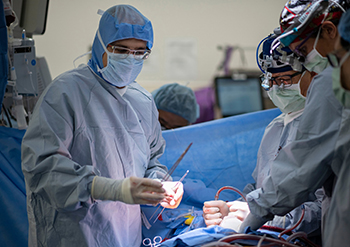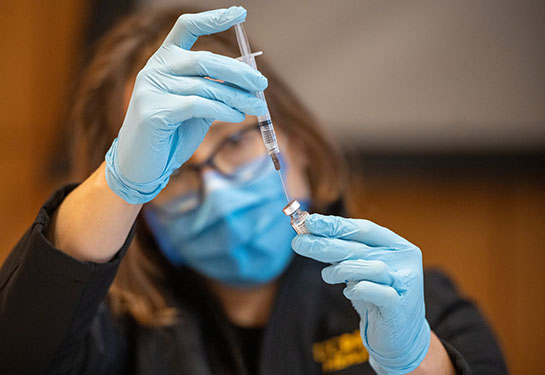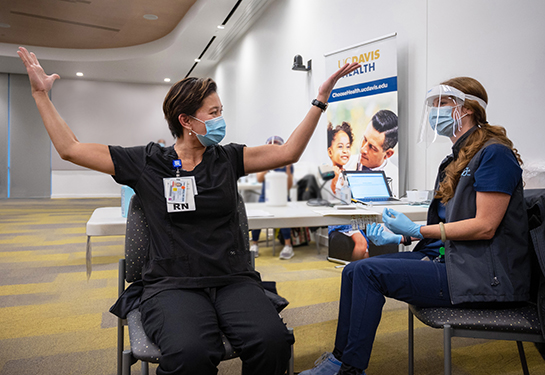What you need to know about COVID-19 and heart disease
Chief of cardiac surgery Bob Kiaii answers questions about coronavirus, heart surgery and more
Heart disease, the leading cause of death in the U.S., is considered a high risk factor for developing COVID-19 complications. Amid concerns about the pandemic, patients with heart disease may be unsure about getting the COVID-19 vaccine, delaying heart surgery and making follow-up medical appointments.

Bob Kiaii, chief of cardiac surgery at UC Davis Health and a pioneer in minimally invasive cardiac procedures, answers some of the common questions patients with heart disease might have.
What are the main concerns for patients with heart disease during the pandemic?
There are two main concerns. One is whether it is safe for a heart patient to have an intervention during this time. The second is the similarity of symptoms between heart disease and COVID-19. Patients sometimes wonder if their symptoms are a result of coronavirus or a heart condition.
Safety is the number one thing that we go by. We also make sure that the patient is involved in the decision-making. As the majority of heart surgeries are considered essential operations, delaying care due to the pandemic has been a very concerning issue. We have been triaging patients and speaking with them about any possible delay in their interventions. We weigh the risks versus benefits, and despite challenges, we are successfully managing patients.
Also, since the pandemic began, we’ve seen a sharp rise in patient video visits. Before COVID-19, less than 5% of visits were done over video. Now, they account for almost 40% of the visits we do. This has made it not only safer but more convenient for patients, specifically those who live far away.
What complications might heart disease patients face if they catch coronavirus?
Unfortunately, heart patients who catch coronavirus have more risks of developing serious complications, including lung problems and blood clots. Our recommendation is to be extremely careful if you have a heart disorder that puts you at higher risk. Continue with proper handwashing, wearing a mask, social distancing and avoiding large gatherings, especially if you are waiting for a heart procedure to be done.
Are you seeing heart problems among the so-called “long hauler” patients, those who have lingering symptoms months after the initial COVID infection?
One potential complication of COVID-19 infection is the formation of clots in the vessels. These clots can block the vessels that provide blood to the lungs and other organs. Patients with clots would require long-term therapy, including blood thinners.
The virus can also cause inflammation of the pericardium, the sac around the heart. This inflammation can build fluid around the heart, compress it and impair its function. In the long term, it can result in the inflammation of the muscle of the heart. Individuals who have been diagnosed with these problems need regular ultrasounds of the heart and must be monitored carefully.
What did heart experts learn from this pandemic?
We are still in very unchartered waters. The most amazing thing we discovered is the predisposition of some people to develop clots. No matter how young you are or your gender or ethnicity, there is a risk of developing clots with COVID-19. Specifically, when patients have very bad COVID-19 consequences, and despite the utilization of ventilators they are still not getting adequate oxygen delivery, we have to put them on heart-lung machine as a last resort to help them with oxygenation. These individuals are at the highest risk of developing the clots. They are prescribed blood thinners. Blood thinners may increase their risk of bleeding. The main thing we are learning is how to manage patients who are extremely ill and require treatment with the heart-lung machine.
Should patients with heart disease get the COVID-19 vaccine?
Heart patients are strongly recommended to get the vaccine. We are often asked if individuals should delay their intervention till after getting the vaccine. If delaying the intervention won’t put them at a significant risk, we very much encourage that. We tell them absolutely get the vaccine and after two or three weeks, they should basically consider having the intervention. Make sure to follow the recommendations for vaccinations and continue to maintain proper social distancing and masking.
— Bob Kiaii, chief of cardiac surgery at UC Davis Health
What’s new in heart surgery at UC Davis Health?
We do everything to provide the safest conditions with the minimum number of required visits, should the patient have to come to the hospital. We try to coordinate all their tests and work-up so that when they do come, they only have one visit before the operation.
It is also important to minimize the patients’ length of stay in the hospital before and after surgery. With COVID-19, this became even more critical. At UC Davis Health, we emphasize the less invasive operations. We’ve developed our robotic-assisted valvular operations that allow patients to spend less time in the hospital and get discharged quicker. We adopt the Enhanced Recovery After Surgery (ERAS) program, specifically after heart surgery. We optimize conditions for patients before their operation: We address their nutrition and provide support to completely stop smoking or at least minimize it. These pre-operation procedures further help in patient recovery. We even look to ensure the availability of social network support for elderly patients before it’s time for discharge. This ERAS program has been a huge success.
What are the symptoms of a heart attack that people need to be aware of?
Heart attack symptoms can be classified as typical and atypical. One typical symptom is the sensation of chest tightness that some people describe as a feeling of an elephant crushing their chest. Pain radiating to the arms or the jaw, shortness of breath, sweating and heart palpitations are other typical symptoms.
Atypical symptoms are usually hard for people to connect with a heart attack. People may present with nausea; others may feel a discomfort in their upper abdomen mistaking it for heart burn. People with diabetes are more prone of having atypical heart attack symptoms or silent symptoms. So, if they are feeling unwell, they need to get their symptoms checked. Younger people tend to be less suspicious that they might have a heart problem. After all, heart disease is not only an elderly type disorder, we see it in younger patients.
How to keep our hearts healthy?
None of us expected to live through a pandemic. The last time such a pandemic happened was almost 100 years ago. The pandemic is adding lots of stress on people. Stress strains your heart, so find ways to build your defense mechanisms against stress. Find ways to occupy yourself with exercise and hobbies. Go for a walk outdoors, enjoy the fresh air. Try to get enough rest, sleep well and exercise as much as possible.
We also recommend that people eat healthy and in moderation. There is no need to completely cut a particular food from the diet, except for medical reasons. It helps though to avoid food that is high in cholesterol, fat and sugar, especially for people with diabetes.
The most important thing is to remind yourself that there is light at the end of the tunnel. With two vaccines, things are improving. We need to have a positive attitude and do our best to cope.
Watch the full interview over Facebook: https://fb.watch/3Apm2JlueZ/



